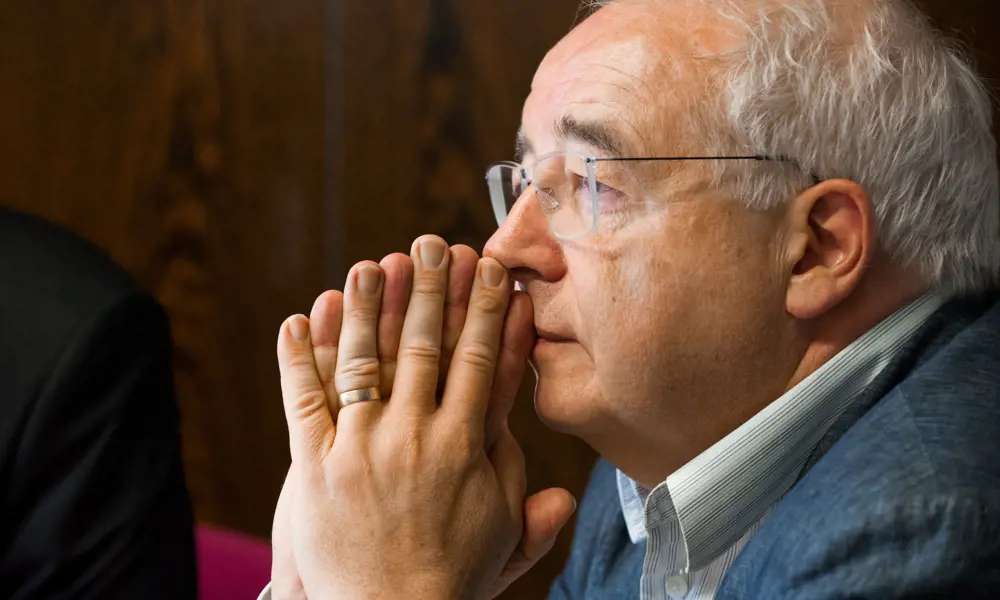
A web of networks
Networks have always been important for David Cleevely CBE FREng. His first job, at what was then Post Office Telecommunications, now BT, was thinking about the future of communications networks. These days, his networks are as much about people as things, and often local to Cambridge, Cleevely’s base since he moved there 30 years ago to do a PhD. Cleevely’s ‘virtual networks’ include a band of ‘angel’ investors who back start-up businesses, often commercialising local research. Then there is the network of movers and shakers that Cleevely is involved in as Founding Director of Cambridge University’s Centre for Science and Policy (CSaP), a think tank that “helps the sciences and technology to serve society by promoting engagement between researchers and policy professionals”. Another network brings together schools around the world as they write programs to run on the Raspberry Pi computer platform that has been an unexpected hit for Cambridge’s network of IT enthusiasts and researchers. Then there are networks of people keen to see that the city gets more than its fair share of communications infrastructure.
An enterprising early life
This ‘people networking’ grew out of Cleevely’s early work with the Post Office on telecommunications networks, a role that might never have happened. “That was an accident, like so many things in my life,” he says. The Post Office had sent someone to his school to try to coax sixth-formers to consider a career with the then nationalised post and telecommunications business. As Cleevely describes it, he was strolling down a school corridor during a break and went along “to fill up the numbers”. He took notice when he heard that the Post Office might give him a grant to go to university.
When he turned up for an interview with the company, he had done enough strange things to persuade them that he might be an interesting candidate. Cleevely had built homemade rockets and there was the school biology field trip where, rather than getting down on his hands and knees to count bugs and flowers, he decided to go up in the world. “I wanted to try and get a complete picture so I built a kite with a camera suspended under it to try and take aerial photographs of the area.” Cleevely also started his entrepreneurial activities around then, again with bugs and flowers involved. “I started a beekeeping club at school. I sold the honey to recoup the cost of the hives.”
When he turned up for an interview with the company, he had done enough strange things to persuade them that he might be an interesting candidate
When it came to picking a degree course, Cleevely opted to study cybernetics. The attraction, he explains, is that it “was about control and robotics, artificial intelligence and all that kind of stuff”. He went to Reading University, one of the few institutions that taught the subject. In line with his extracurricular goings-on at school, where he was involved in acting, directing school plays and writing music, at university Cleevely got involved in other activities. “I played around a bit in politics. I played around with economics.” Both topics came to be increasingly important as Cleevely’s career progressed.
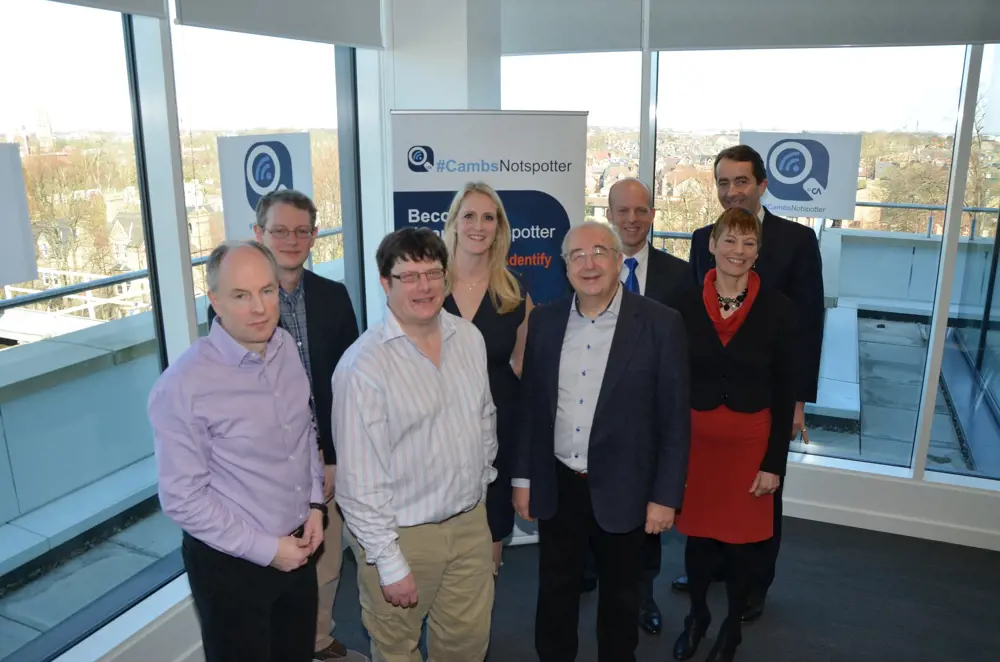
The latest move in David Cleevely’s continuing aim to get better telecoms in Cambridge is a new campaign for the rollout of better broadband, wi-fi and mobile services through the Cambridge Ahead network, which launched the #CambsNotspotter initiative to identify gaps in service in the area. He is seen here with representatives from some of the other partner organisations at the initiative’s launch event © Cambridge Ahead
Cybernetics may have been a fascinating undergraduate subject, but Cleevely didn’t see it as a career option. “I went into the long-range studies division at Post Office Telecommunications.” This internal think tank, based in Cambridge, pondered the future of telecommunications. “We were looking ahead 20 or 30 years,” Cleevely explains.
The 1970s were interesting times for telecoms. Back then, the telephone network did little more than handle telephone calls, but there were hints of things to come. “I had to look at what might happen if you had a computer on your desk. Could you use it for word processing and messaging as well as for doing computational stuff, and what would the implications of that be?”
One piece of research sticks in Cleevely’s memory. Telecoms in the 1970s were entering the digital era, with telephone exchanges abandoning mechanical switches for electronic digital switching. Post Office Telecommunications wanted to assess how the prices of electronic components might develop. By coincidence, Cleevely had just read a book that has since acquired legendary status: Gordon Moore’s account of the thinking behind his ‘law’ showing that the number of transistors that you could cram on a chip would double every 18 months or so. “I did some digging into the fundamental physics of memory devices and some of these other things. I thought about the economies of scale and I just went ‘There is no limit to this. We are so far away from the physical limit’.”
The views of a young rebel did not go down well. Everyone else in the business had predicted prices falling by around 3–8% a year, and here was Cleevely forecasting falls of “30, 40, 50, 60% a year, and not just for one year. It goes on”. His analysis provoked a visit from London and a request to reconsider his forecast. Cleevely demurred and the Post Office removed his analysis from the exercise.
It wasn’t all lost causes for the young Cleevely. His boss took him along to University College London to advise on a bid for backing. “This new project was absolutely weird and wacky at the time,” Cleevely recalls. “These Americans had this idea of breaking information up into packets and sending them across the Atlantic. They wanted us to join this funny thing called the DARPAnet [the US’s military network].” The project was all about protecting the network from a nuclear attack. “Could you extend it via satellite out to the UK and would Post Office Telecommunications collaborate?”
The pitch may have been hard to follow, but the idea appealed to Cleevely, who advised his boss that “someday all information will go by packets”. Looking back, he comments: “I don’t claim that I had thought that remark through,” but adding this idea to his understanding of the likely impact of Moore’s law convinced Cleevely that packet switching would do much to smash the cost of communications.
It confirmed to me that they did not understand how the world was changing around them. I didn’t really want to be a part of that because it was going to be very frustrating
This success did not persuade Cleevely to stick with the Post Office. The rejection of his views on the likely cost of electronics didn’t go down well with him and prompted Cleevely’s next career move. “It confirmed to me that they did not understand how the world was changing around them. I didn’t really want to be a part of that because it was going to be very frustrating.”
He left to pursue a PhD at Cambridge on telecommunications and economic development. In part this was, he says, because he wasn’t sure that his ‘intellectual toolbox’ was up to scratch. He wanted to do something about that and embarked on applying what he calls “some old geography theory” to telecommunication.
With his PhD completed, Cleevely put his research to use by joining the Economist Intelligence Unit (EIU), writing reports for clients on the economic aspects of telecoms technologies and applications. For example, one project for BT looked into putting optical fibre into the City of London. Then there was a series of projects for the EU on the economics of telecoms.
Turning expertise into success
Cleevely says that he made a lot of mistakes during his two and a half years at the EIU, but that did not stop him from becoming head of the telecommunications division. Telecoms consulting was, after all, a new activity. He learned a lot and built up enough contacts to set up his first business, Analysys, a consultancy that set out to go beyond the work of the EIU. Analysys started up with some work for the EU. “I understood how the European Commission works,” he says with a laugh. “It is a strange and wonderful beast.”
Analysys arrived at just the right time. The company’s business quickly progressed from straightforward consulting into projects modelling telecommunications investment in Europe. This was a big contract that prompted Cleevely to recruit software engineers to write the software for the models and the systems that he believed Analysys would need to survive. “I saw that the future of consultancy was going to be in how well you could manage information and what we would call now process flow.”
What the modelling did was to establish our reputation as people who understood the intersection of economics and telecommunications, engineering economics
The modelling work was something of a breakthrough. “We were the only people to be able to model how telecommunications investment was likely to emerge. What the modelling did was to establish our reputation as people who understood the intersection of economics and telecommunications, engineering economics.”
By the end of the 1990s, the world was waking up to the importance of telecoms. It was also beginning to see the value of software and the potential of what was to become the World Wide Web. The software that Analysys developed didn’t just give the company an edge in its modelling, it played a part in how it handled information internally. “The systems that we were then building meant that we were able to share knowledge and expertise during the 1990s so that when the internet and the web came along we were already pre-adapted.”
The modelling work was something of a breakthrough. “We were the only people to be able to model how telecommunications investment was likely to emerge. What the modelling did was to establish our reputation as people who understood the intersection of economics and telecommunications, engineering economics.”
By the end of the 1990s, the world was waking up to the importance of telecoms. It was also beginning to see the value of software and the potential of what was to become the World Wide Web. The software that Analysys developed didn’t just give the company an edge in its modelling, it played a part in how it handled information internally. “The systems that we were then building meant that we were able to share knowledge and expertise during the 1990s so that when the internet and the web came along we were already pre-adapted.”
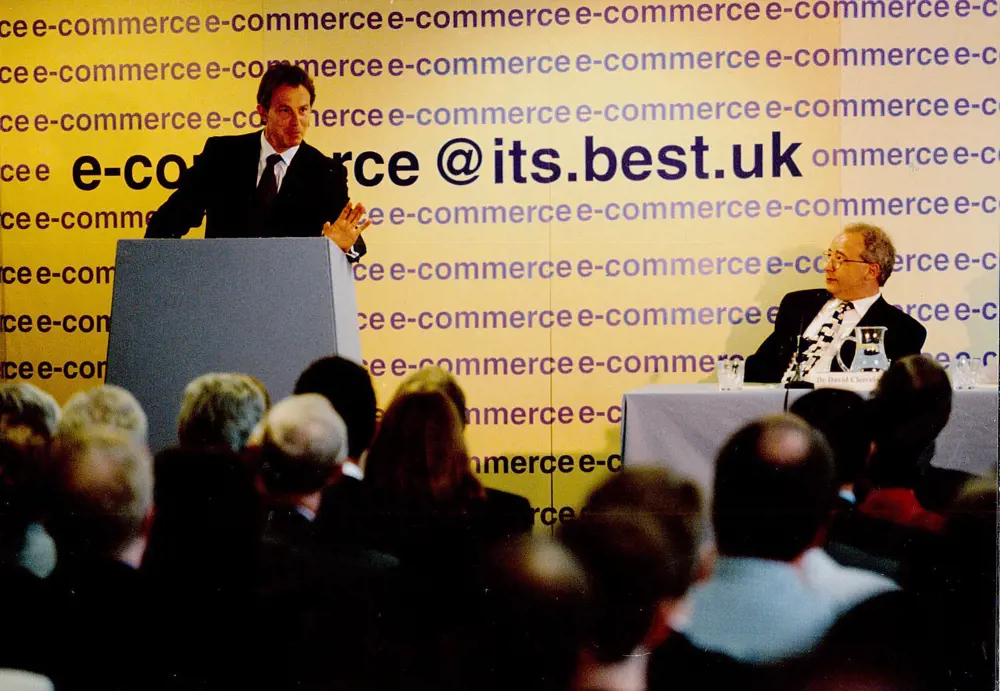
Tony Blair, then prime minister, with David Cleevely at the launch of the e-commerce@its.best.uk report in Cambridge in 1999, a cue for some networking to improve the city’s telecoms © Cambridge Evening News
Software expertise
The software expertise also proved valuable when Cleevely became involved in another of life’s unexpected events: the start of a new business that was to change his life. In another of those networking dinners, Cleevely was sitting next to Jonathan Milner, a young researcher looking at breast cancer. Frustrated by the quality of the antibodies he had to buy for his research, Milner wanted to sell high-quality antibodies. Long before shopping on Amazon became commonplace, Milner and Cleevely came up with the idea of a web-based business. “Analysys had all the web-based tools for doing this,” Cleevely explains. “We had already developed the technology.” In effect, he adds, Analysys “did a tech transfer and built the web systems for them”.
Cleevely liked Milner’s idea so much that he invested in Abcam, the new company set up in 1998 to commercialise it. Cleevely chaired the business until 2009, by which time he had overseen the public float of Abcam, turning it into a billion-dollar business.
As Cleevely points out, it is somewhat ironic that he made his ‘big money’ in life sciences rather than telecoms, his original expertise. However, thanks partly to the success of Abcam, Cleevely was also behind a number of telecoms start-ups; 3Way Networks, for example, which produced wireless base stations for domestic and business use, was sold to Airvana. “A lot of the people from that are working with me in other companies at the moment.” So that network survives. Then there is his investment in businesses that have nothing to do with technology. His biggest, he says, is in award-winning London restaurant, Bocca di Lupo, along with a Cambridge pub.
it is somewhat ironic that he made his ‘big money’ in life sciences rather than telecoms, his original expertise
Cleevely can’t remember how many companies he has backed. “It’s about 60 or 70.” There have also been a few failures. Again Cleevely is vague on the numbers. “Six, eight things that have gone bust. Maybe 10. I don’t know. They have been fairly small,” he adds. Apart from the one that got away, that is; a web business called Trutap came to nothing when the hedge fund that was supposed to back it pulled out without warning. Again, Cleevely laughs off the failure, pointing out ruefully that a few months later a lookalike start-up, Whatsapp opened for business and went on to become another of those billion-dollar Silicon Valley superstars. Five years later, Facebook paid nearly $20 billion for it.
Cleevely’s role as an ‘angel’, investing in new businesses, was developing. He was co-founder of a network of Cambridge angels in 2001 when Robert Sansom, another local entrepreneur who had had a number of successes in the USA, asked why there wasn’t one.
Cleevely added to his investment pot when he sold Analysys to Datatec International in 2004. “I took some cash away from that. It is not money to be sneezed at.” This sale ended his days of full-time employment. “But as my wife explains, I am probably busier now than I have ever been.”
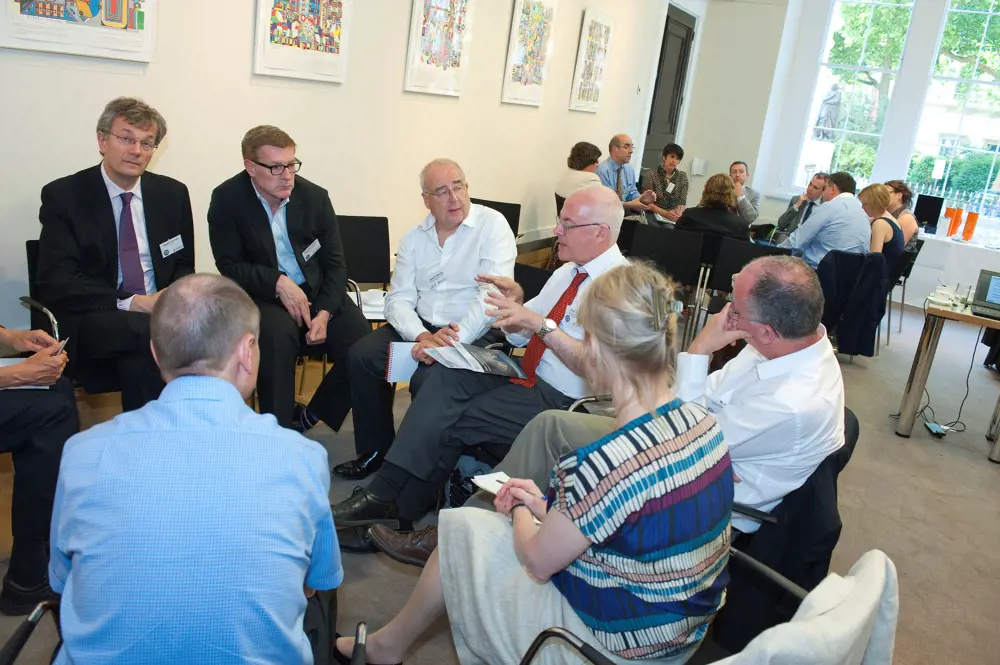
David Cleevely networks with CSaP policy fellows at one of its Policy Challenge events, held at the Royal Academy of Engineering. CSaP’s Policy Challengeinitiative aims to identify and address high-priority public policy issues © CSaP
Influencing policy
Cleevely’s busy-ness takes in several major activities that exploit his networking skills. Perhaps the most visible is as founding director of the CSaP, with a remit “dedicated to bringing together the best scientific thinking across all disciplines in order to inform public policy”.
Cleevely says, half-jokingly, that he got the job because the university couldn’t find anyone else. In reality, Cleevely was a good choice to run the CSaP because he wasn’t yet another academic intent on running research programmes and producing papers read by no-one outside the community. He admits that there was pressure to churn out reports that they could deliver to policymakers “to get them to change their policy”, as he puts it. That notion is, he insists, “bonkers, absolutely bonkers. It is a self-serving misrepresentation of what is going on in policy formation”.
Cleevely talks from experience when he describes how policy happens. As well as his consulting work over many years, he contributed significantly to a report requested by the Prime Minster’s Office, e-commerce@its.best.uk, “laying the ground for what we had to do to improve e-commerce in the UK”. When Tony Blair, then prime minister, launched the report in Cambridge in 1999, Cleevely used the event as a way of using his network of contacts to persuade British Telecom to bump Cambridge up the list of places where it would roll out broadband. To this day he continues to campaign, through a network known as Cambridge Ahead, for better telecoms in the area.
It is this ability to operate ‘off piste’ that Cleevely is keen to promote at the CSaP. “My logic is that the research is sitting there already,” he says. “The focus was not on policy content, it was on organising events. It was all about networking.”
If you put a policymaker into an academic environment for a few days they go back; they have understood where a lot of the research is coming from, a lot of the dynamics and a lot of the networking
Cleevely sees limited benefit in parachuting academics into policy circles. After their time in the corridors of power “they mostly go back to doing their academic work”. He believes it is better to work the other way round. “If you put a policymaker into an academic environment for a few days they go back; they have understood where a lot of the research is coming from, a lot of the dynamics and a lot of the networking. If they have got a problem, they have got a ready-made network.” The networks are growing: “We have 220 policy fellows, and over 1,000 academics and other experts. More than 6,000 meetings have taken place between them.”
He cites a recent example of a meeting for the permanent secretaries and director generals who run government departments and agencies. The event was all about artificial intelligence (AI). The delegates arrived wondering why they were there, but left convinced that AI would be important for their departments. As Cleevely reports it, the response was: “As far as I am concerned the impact of AI on my department is going to be far-reaching, and I’m going back and I’m going to have to take this into account.”
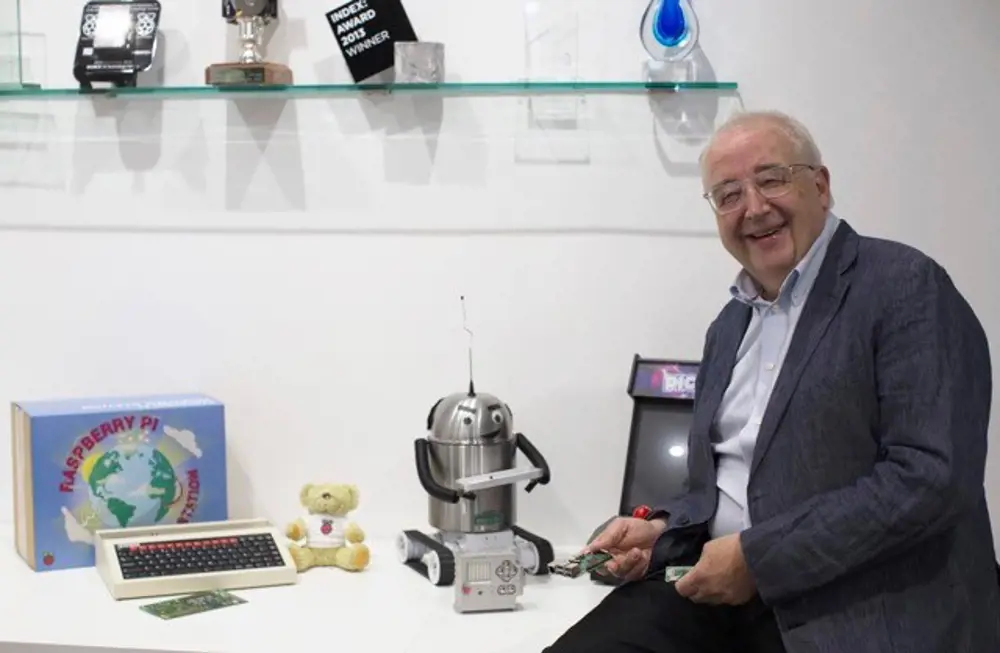
The Raspberry Pi was the brainchild of researchers at the University of Cambridge’s Computer Laboratory, who were concerned about the decline in the numbers and skills levels of the A-level students applying to read computer science. They turned to ARM, another part of the local Cambridge IT networks, and used Broadcom’s processor based on ARM technology to design a credit-card-sized computer. The company has already sold more than eight million of them.
Another piece of the pie
Another important venture that Cleevely has got involved in, the Raspberry Pi, depends on a different local network. He describes this credit-card-sized computer as his current engineering passion. Indeed, you could say that it has reawakened his interest in engineering. Raspberry Pi is a single-board computer designed to introduce youngsters to programming or coding. For as little as five dollars, you can buy a basic computer. “It is the only computer that has ever been given away for free on the cover of a magazine,” says Cleevely with a characteristic laugh. The latest incarnation of the device, the Pi 3, is potentially a desktop computer at $35, says Cleevely. Made at Sony’s factory in South Wales, “it is a huge British success story”.
There are two arms to the Raspberry Pi operation: a trading company makes and sells the hardware and the Raspberry Pi Foundation uses the profits to support educational activities around the world. Raspberry Pi first asked Cleevely to join the board of the trading company as he knows “a bit about this stuff”. It was then decided that he would be a good candidate to chair the foundation.
Cleevely has even found ways of tapping the Raspberry Pi in his business activities. “Several of the companies that I am chairman of are using the Raspberry Pi for industrial applications.” OpenIOLabs, for example, started with the aim of selling microscopes. “To make it work you need a controller to drive the microscope.” After a slow start selling microscopes, OpenIOLabs changed direction and started making controllers that could handle all manner of devices and systems. “Every single gadget that you are now connecting up, you just have one universal box that connects everything and allows you to control and collect data.” The company has already sold systems to CERN, the Lawrence Livermore National Laboratory in the USA, and the local plant biology labs.
As entrepreneurs, starting a company and having a business idea, that is just the beginning. You need to understand how to grow it
Career timeline and distinctions
Born, 1953. Post Office student, 1972–1976. Awarded BSc in cybernetics and instrument physics with mathematics, University of Reading, 1976. Awarded PhD in telecommunications and economic development, University of Cambridge, 1982. Director of telecoms division, Economist Intelligence Unit, 1982–1985. Managing Director then Chairman, Analysys Ltd, 1985–2004. Chairman and Founder, Abcam, 1998–2009. Co-founder, Cambridge Angels, 2001–present. Fellow of the Institution of Engineering and Technology, 2003. Chairman and Co-founder, 3WayNetworks, 2004–2007. Chairman and Co-founder, CRFS, 2007–2020. Chairman of the Advisory Council and Founding Director, Centre for Science and Policy, University of Cambridge, 2008–present. Fellow of the Royal Academy of Engineering, 2008. Chairman, Raspberry Pi (Trading) Ltd., 2012–2016. Fellow Commoner, Queens’ College, University of Cambridge, 2013. Commander of the Order of the British Empire, 2013. Chairman of the Board of Trustees, Raspberry Pi Foundation, 2014–2020. Honorary Fellow, Trinity Hall, University of Cambridge, 2015. Chair and Co-founder, Chemify Limited 2021–present.
Once again, Cleevely’s overlapping networks mean that business, engineering and social activities rub shoulders. The latest addition to Cleevely’s web of networks, called the School for Scale Ups, will help companies to survive growing pains as they move from being a start-up to a profitable business. “As entrepreneurs, starting a company and having a business idea, that is just the beginning,” says Cleevely. “You need to understand how to grow it.”
This one comes under the umbrella of the Cambridge Network, a new member of the web of networks that Cleevely helped to spin, and one that acts as an umbrella for many local initiatives. With 1,500 members, the Cambridge Network is, he says, “everybody in high tech and the University of Cambridge networking together”. Cleevely may be sitting in the middle of a bewildering array of networks, but he is still aware that you have to be careful in how you use all those contacts. “Networks are good except when they are subverted for purposes that might be non-transparent and against the public interest. In which case they become the Mafia.” So far, he seems to have avoided that in Cambridge.
***
This article has been adapted from "A web of networks", which originally appeared in the print edition of Ingenia 67 (June 2016).
Contributors
Michael Kenward OBE
Author
Keep up-to-date with Ingenia for free
SubscribeRelated content
Technology & robotics

When will cars drive themselves?
There are many claims made about the progress of autonomous vehicles and their imminent arrival on UK roads. What progress has been made and how have measures that have already been implemented increased automation?
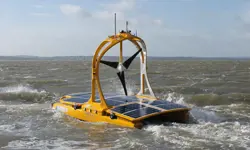
Autonomous systems
The Royal Academy of Engineering hosted an event on Innovation in Autonomous Systems, focusing on the potential of autonomous systems to transform industry and business and the evolving relationship between people and technology.
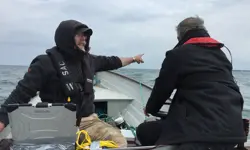
Hydroacoustics
Useful for scientists, search and rescue operations and military forces, the size, range and orientation of an object underneath the surface of the sea can be determined by active and passive sonar devices. Find out how they are used to generate information about underwater objects.
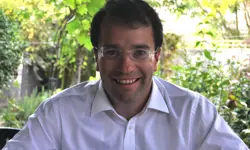
Instilling robots with lifelong learning
In the basement of an ageing red-brick Oxford college, a team of engineers is changing the shape of robot autonomy. Professor Paul Newman FREng explained to Michael Kenward how he came to lead the Oxford Mobile Robotics Group and why the time is right for a revolution in autonomous technologies.
Other content from Ingenia
Quick read

- Environment & sustainability
- Opinion
A young engineer’s perspective on the good, the bad and the ugly of COP27

- Environment & sustainability
- Issue 95
How do we pay for net zero technologies?
Quick read

- Transport
- Mechanical
- How I got here
Electrifying trains and STEMAZING outreach

- Civil & structural
- Environment & sustainability
- Issue 95